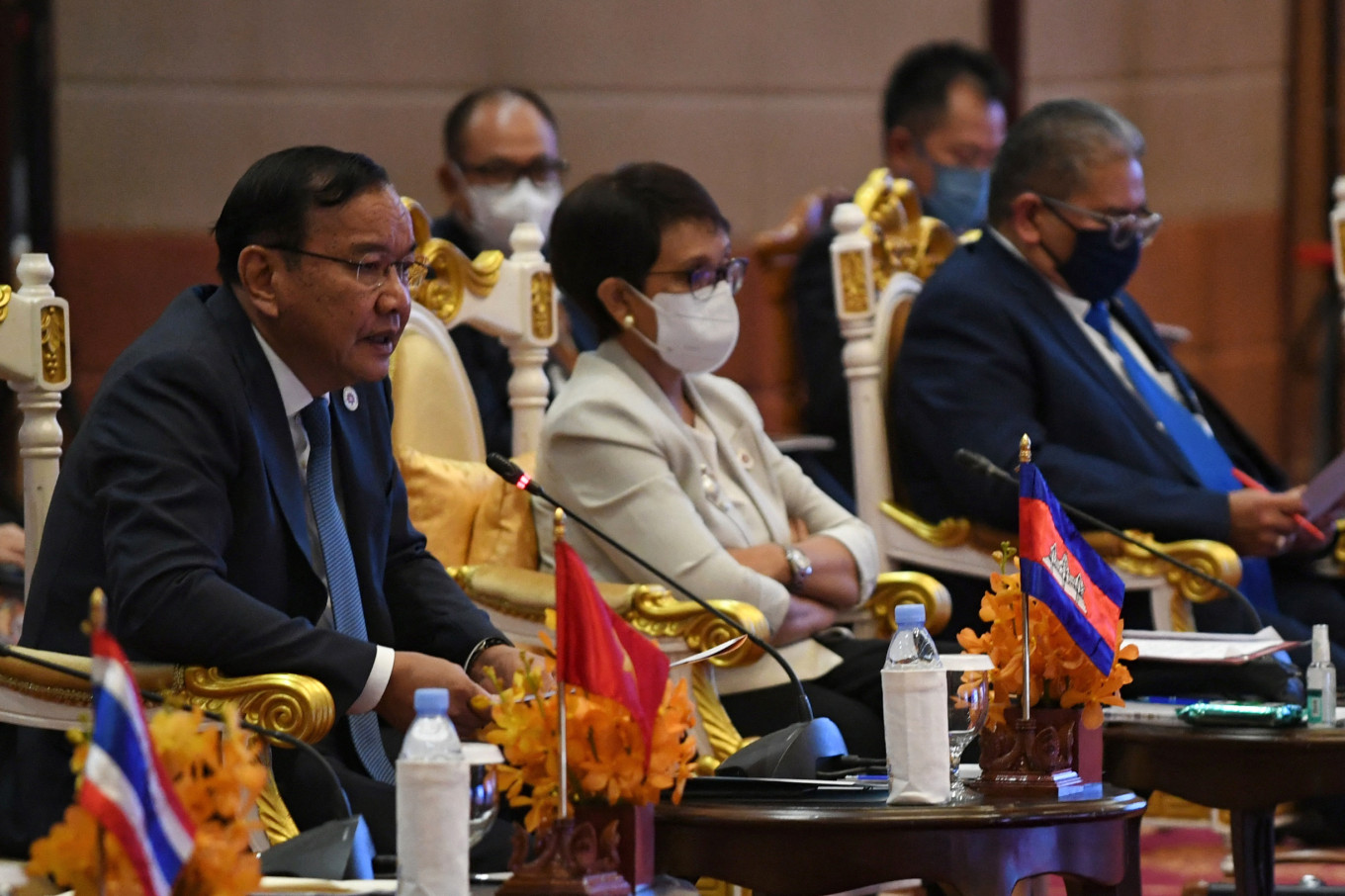Popular Reads
Top Results
Can't find what you're looking for?
View all search resultsPopular Reads
Top Results
Can't find what you're looking for?
View all search resultsTime to strengthen human rights protections for ASEAN
The ASEAN human rights declaration, as it stands, is not perfect – notably omitting reference to a number of fundamental rights, such as freedom of association.
Change text size
Gift Premium Articles
to Anyone
 Cambodia's Foreign Minister Prak Sokhonn (left) speaks next to Indonesian Foreign Minister Retno Marsudi (center) and Brunei Second Minister of Foreign Affairs Erywan Yusof (right) at a meeting with the ASEAN Intergovernmental Commission on Human Rights (AICHR) representatives during the 55th ASEAN Foreign Ministers’ Meeting in Phnom Penh on August 2, 2022. (AFP/Tang Chhin Sothy)
Cambodia's Foreign Minister Prak Sokhonn (left) speaks next to Indonesian Foreign Minister Retno Marsudi (center) and Brunei Second Minister of Foreign Affairs Erywan Yusof (right) at a meeting with the ASEAN Intergovernmental Commission on Human Rights (AICHR) representatives during the 55th ASEAN Foreign Ministers’ Meeting in Phnom Penh on August 2, 2022. (AFP/Tang Chhin Sothy)
T
his week marks the 10th anniversary of the ASEAN Human Rights Declaration, which held out great promise for achieving a more people-centered community, anchored in respect for human rights.
ASEAN members have made important progress in economic and social development in particular, and deepened their sense of shared identity. Through different platforms and forums, ASEAN has also assumed a central role in regional security discussions.
The regional group is to be commended for trying to find ways to complement the international human rights system as an expression of the universality of human rights. The challenge now is ensuring its mechanisms evolve so that they can have real impact on the lives of all of its peoples today and tomorrow.
The declaration, as it stands, is not perfect – notably omitting reference to a number of fundamental rights, such as freedom of association, while unnecessarily qualifying others, and framing them as subject to sometimes problematic national laws. The declaration would also have benefited from broader engagement with civil society actors during the drafting process.
It was preceded by the welcome establishment of ASEAN’s own regional human rights mechanisms, the ASEAN Intergovernmental Commission on Human Rights (AICHR) and specialized bodies on migrant workers, women and children. Importantly, five of the 10 ASEAN member states have established independent national human rights institutions to play protection and promotion roles at the national level.
As we mark this anniversary, what better time to initiate a broad-based consultation, involving the strong civil society actors and capable human rights defenders in the region, to identify ways the ASEAN framework and mechanisms can be strengthened and updated. This would include ways to diversify the appointment of AICHR members, increase their independence and expand their mandate with more effective tools for early warning and protection.
Significant human rights challenges remain, exacerbated in recent years by the social and economic impact of COVID-19 and the increasingly frequent and severe impacts of climate change and extreme weather events.
Discrimination persists for ethnic and religious minorities; indigenous people continue to be threatened on their lands and in their cultures; and the picture for women and sexual minorities remains mixed. ASEAN countries are both a source and host of significant migrant and refugee communities who often face precarious conditions and uncertain legal status.
In a number of countries the space for civil society and independent media has been curtailed by repressive laws and authoritarian styles of government. Freedom of expression, peaceful assembly and democratic aspirations are severely constrained in parts of the region. In some instances, an iron-fisted approach to drug control has led to overcrowded jails, unlawful killings and a misguided resort to the death penalty.
Against the broader trend of progress, the situation in Myanmar has plunged into darkness, with international crimes against Rohingya people, and now the military’s brutal suppression since their unlawful grab for power in January 2021.
Today we recognize the right to a safe and healthy environment in the face of climate change, the loss of forests and bio-diversity, and impacts of transnational haze. It’s increasingly clear that rights need to be equally protected in the digital and online space, where freedom of expression runs up against hate speech and other serious social harms. Business actors are becoming more aware of their responsibilities to respect human rights and AICHR has begun to engage them as a constituency to promote positive change. Rapid social change is leading us to rethink traditional gender roles, and confront other inequalities and stigmas.
Today we also look increasingly to regional human rights mechanisms as a first line of prevention and defense of human rights, complementary to international standards. For instance, on the African continent, it is typically African regional institutions that are the first responders to coups and crises in the African region. In responding to crises like Myanmar, it will be important for ASEAN to go beyond its political and humanitarian dimensions and encompass a broader human rights approach as well.
In their Phnom Penh Statement on the adoption of the Declaration, ASEAN leaders made clear the ASEAN rights framework would remain grounded in the Universal Declaration of Human Rights (UDHR) and international human rights standards. As ASEAN marks this anniversary – and we approach the 75th anniversary of the Universal Declaration of Human Rights – it is a timely opportunity for ASEAN to consider updating and strengthening its human rights machinery.
***
The writer is United Nations High Commissioner for Human Rights.










